
May 09 2020.
views 750It was only a matter of time before plain old boring utilitarian facemasks would be replaced by brightly hued facemasks. In order to cater to the increasing demand for facemasks many of the world’s leading fashion houses moved from stitching haute couture clothing to sewing facemasks which were then donated to hospitals. Our Etsy and Instagram feeds are full of imagery of colourful masks fashioned by creative beings hemmed in at home with nothing to do.
As the world we inhabit looks past COVID-19 it is certain that facemasks will continue to play a pivotal role in our lives. Everyone is now encouraged to wear masks as they have evolved to a hybrid between a medical requirement and a fashion statement, consciously or not. The market of opportunity is rife with the demand for fashionable masks on the rise.
Here in Sri Lanka too, a clutch of designers have embarked on creating fashion masks. For the designers behind The Old Railway, Salt and Selyn, the need to create fashion masks stems from their desire to keep working so that they can continue to employ their staff and ensure a wage for them is constant.
For Catherine Rawson from Galle based designer store The Old Railway, the desire to make fashion masks arose out of necessity. She says “ I am determined to keep my staff in their jobs. I also have had my parents staying with me and we found the masks available in the pharmacies to be badly made and ill-fitting.”
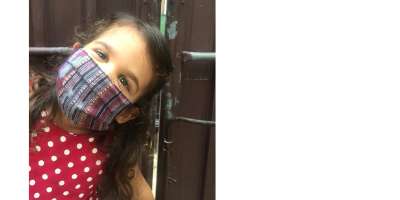
Prasanna Segarajasekeran, the founder of SALT, a store that creates batik clothing began making masks because there was a shortage of N-95 masks. “Making an alternative available to the general public would lead to more N-95 masks for the use of people working in the front-line and also it gave us the opportunity to continue to provide some of our staff with work and generate enough income to pay them and our other staff members who are unable to work at the moment,” he says.
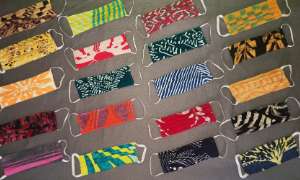
For Selyna Peiris, Director, Business Development at Selyn the decision to make masks out of their handwoven fabric came about only after the World Health Organisation made an announcement endorsing the use of cloth masks mainly to ease the pressure on the demand for surgical masks which are supposed to be reserved for medical personnel. She explains that they had the advantage of starting the project as part of a global initiative of the World Fair Trade Organization (WFTO) Asia. “This project gave us access to the HK Mask Design and the masks are produced based on a laboratory-tested system using fabric masks and filters coupled with proper washing and sanitation. It is a reusable cloth mask with a disposable middle layer filter with filtration efficiency close to that of an N70 mask” she adds.
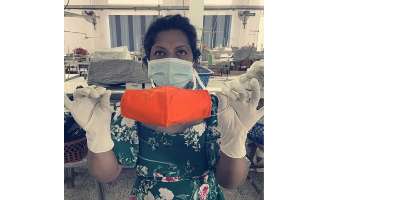
For all three entities, sustainability is key in making these masks. Segarajasekeran uses the offcuts of batik fabric for the creation of his masks. Similarly, Rawson fashions her masks from fabric that would have otherwise ended up as landfill while Seyln also uses handloom fabric offcuts.
Situated in the coastal town of Galle which has a large expatriate community and a few tourists milling about, Catherine has had many requests for her fashionable cloth masks. “I think it has sunk in for most people that we will need these on a daily basis for quite some time. It will be the first thing people see when they meet you” she adds.
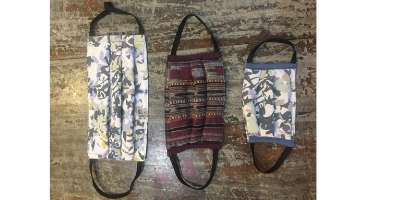
Despite initially making his first batch of masks for his staff and family members who simply could not find any masks, Segarajasekeran had no intention of selling them. He also did not want to be “misunderstood as a business trying to profit off this unfortunate situation.” However after an overseas client imparted a few wise words, he realised he had to think smartly and act sharply, or else his employees would see their work drying up. It was therefore quite fortuitous that he received an order from overseas. Segarajasekeran says “the idea was never to sell it as a ‘fashion’ mask but as a re-usable alternative to the N-95 masks. However, we were approached by one of our dear customers in the UK who convinced us of the positive impact these masks would have especially in England where the situation was much worse and placed an order for 100 masks. We don’t use fancy catchphrases or hashtags to promote our masks, in fact to date we haven’t even done a post about them on our social media.” Receiving feedback has been important for them and for Rawson her parents holidaying in Sri Lanka gave her valuable feedback which prompted her to make the facemask in a few designs including using a velcro strap at the back and another to accommodate people who wear hearing aids.
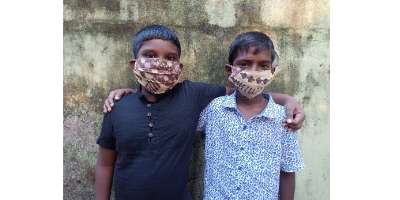
It is however pertinent to mention that these fashion masks are not a replacement for the N-95 masks. Thinking out of the box is imperative at times like this and thanks to the forward-thinking of these three business entities, their employees will remain in work until the storm is weathered and brighter prospects arrive on the horizon.
0 Comments